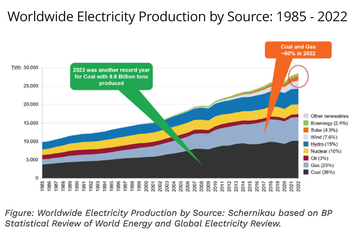
“With coal almost any feat is possible or easy; without it we are thrown back into the laborious poverty of early times.” (The Coal Question William Stanley Jevons, 1865).
Is this quote still valid, almost 160 years later?
Coal is globally, and certainly for South Africa, the most important source of power. The commodity is required for almost every product and structure that we see around us and use every single day, either directly or indirectly. There is virtually no machine, cement, steel, aluminum, building, car, computer, iPhone, or even a solar panel or windmill that can be created without coal.
In South Africa, the warnings of many engineers, economists and other experts within the energy sector that South Africa won’t easily walk away from coal has already played itself out in the political scene in 2023 when the Minister of Mineral Resources and Energy, Gwede Mantashe, a former coal miner, called the just energy transition that advocated for a rapid transition towards “renewable” energy only, “a foreign concept”. In response, the ANC led government, presumably under the pressure of international investors and the media, created a new portfolio titled Minister of Electricity. The new Minister Ramakgopa initially recommitted to the “green” transition, but shortly after the closure of the Komati Coal Power Station, he also started speaking out against “the end of coal”. The blowback was felt throughout the corridors of power to the extent that even the Presidential Climate Commission admitted that “little attempt had been made to consult with workers”.
The Democratic Alliance, the official opposition who is South Africa’s de facto green party, did not fare better. Despite having an official position “against coal”, the DA mayor of Pretoria, Mr. Cilliers Brink’s spokesperson, Sipho Stuurman, recently announced that the city intends on bringing back the 300 MW Rooiwal Coal Power Station for at least 10 years. Brink’s revelation came only a few months after the announcement of his 2050 Net Zero Strategy that presumably foresees “the end of coal”.
Even though critics have accused the ANC leadership of “fake news”, and exaggerating the situation, it’s worth reflecting why it is so difficult for South Africa to simply “walk away from coal”. Interestingly, as South Africa’s electrical utility Eskom faces challenges to keep the lights on, a pragmatic energy realism has emerged that does not fall on traditional political party lines.
Supporting coal is often viewed as a heretical form of “denial” of climatic changes and an “ignorance” of the “toxic” poisons spewing from coal plants. However, the reality is that (a) modern coal is not what it used to be (b) coal releases FEWER greenhouse gas emissions than LNG imports, over the entire supply chain and (c) economic trade-offs and not ideological purism should be what drives the decision making in developing nations such as South Africa.
In a global context, coal holds significant value. This fuel, derived from plants that have existed for millions of years, continues to maintain its status as the foremost source of electricity and the second most crucial source of primary energy, accounting for approximately 36% and 25%, respectively, in the year 2023. As the graph below shows, its absolute volumes continue to set new records almost every year, despite a slight reduction in the global share of coal.
Read the rest of this piece at Hügo's Newsletter.
Hügo Krüger is a South African born Structural/Nuclear Engineer, writer and YouTube podcaster, commentating on topics relating to Energy and Geopolitical Matters, Hügo is married to an Iranian born Mathematician and Artist; the couple resides in Paris.
Figure: Worldwide electricity production by source; Schernikau based on BP Statistical Review of World Energy and Global Electricity Review.












